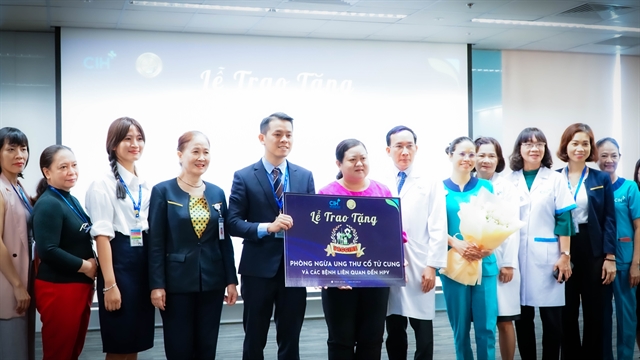 Society
Society

Dr Saiko*
The answer is “No.” - according to Dr Saiko, an experienced obstetrician and gynecologist at Family Medical Practice.
.jpg) |
| Doctor vaccinates a patient. — Photo freepik.com |
What is HPV?
The human papillomavirus (HPV) is one of the most common sexually transmitted infections worldwide, with over 100 different strains. Some of these strains can lead to severe health problems, including cervical cancer in women, penile and oropharyngeal cancers in men and genital warts in both sexes.
The vaccine targets specific strains of the virus that are most likely to cause these conditions. Currently, there are three types of HPV vaccines: bivalent, quadrivalent and nine-valent, which protect against 2, 4, and 9 types of HPV, respectively.
Who should get vaccinated?
While the HPV vaccine is often associated with young women because of its ability to prevent cervical cancer, it is important to note that it is recommended for all genders. Men are at risk of developing cancers and genital warts due to HPV, including oropharyngeal (throat), penile and anal cancers. Vaccinating males not only protects them but also reduces the risk of spreading the virus to future partners.
The ideal time to administer the HPV vaccine is before an individual becomes sexually active, typically around the ages of 11 or 12. However, the vaccine has proven effective for individuals up to the age of 45. Therefore, it remains relevant for adults, especially those considered to be at high risk due to their sexual history or previous exposure to HPV.
Benefits of the HPV vaccine
One of the most remarkable aspects of the HPV vaccine is that it is the only vaccine that can prevent certain types of cancer. Cervical cancer prevention is the most commonly recognised benefit for women, but men benefit similarly by reducing their chances of developing cancers related to the HPV strains covered by the vaccine.
In addition to cancer prevention, the HPV vaccine significantly reduces the risk of genital warts, which are a common, uncomfortable and often recurrent symptom of HPV infection. This adds to the public health significance of widespread vaccination efforts.
Limitations and continued screening
Despite the impressive protective qualities of the HPV vaccine, it does not offer complete immunity from all HPV strains or the diseases they cause. As a result, regular medical checkups, including cervical cancer screenings for women, are still recommended even after vaccination. The combination of vaccination and regular health screenings is essential for comprehensive prevention and early detection of potential health issues.
Conclusion
The HPV vaccine is a powerful tool in the fight against HPV-related diseases, including various forms of cancer and genital warts. It is not only for young women but also for men, offering protection and reducing the risk of transmitting the virus. By vaccinating individuals early, ideally before they become sexually active, we can significantly reduce the incidence of HPV-related health problems.
Even adults up to age 45 can benefit from this vaccine, especially those at higher risk. Along with continued medical screenings, the HPV vaccine represents an essential component of preventive health care.
Family Medical Practice offers the HPV 9-valent vaccine which is known to be the most effective type among three types available in the current world. Even in modern medicine, the HPV vaccine is the only vaccine that can prevent cancer. Also, following the vaccination schedule has an almost permanent effect, so please consider getting vaccinated if you or your child hasn't been vaccinated yet. Family Medical Practice
*Dr Saiko Sugiyama is a highly versatile medical doctor with over 20 years of experience. She is the only doctor in Japan to hold three specialist licences in obstetrics and gynaecology, radiology and acute medicine, granted by Japanese academic authorities.
Dr Sugiyama joins Family Medical Practice as an obstetrician/gynaecologist and a certified mammography interpreter. Fluent in both Japanese and English, she is able to effectively connect with patients from diverse cultural backgrounds. She addresses a wide range of women’s health issues, notably: menopausal disorder/ hormonal disturbance in postpartum or puberty management from various approaches depending on the life stage and preferences, polycystic ovarian syndrome management, perineal/vaginal warts.
To book an appointment with Dr Saiko Sugiyama, please contact our FMP medical centre at 95 Thảo Điền St, District 2, HCM City; via phone at (+84) 28 3744 2000; or email d2.reception@vietnammedicalpractice.com.
Family Medical Practice - FMP Healthcare Group operates medical centres in major cities including HCM City, Hà Nội and Đà Nẵng, offering consultations with international doctors, check-up centres and emergency ambulance services. In HCM City, they have clinics in Districts 1, 2 and 7, along with the Care1 - Executive Health Check-Up Centre and internationally accredited *9999 emergency ambulance services.




